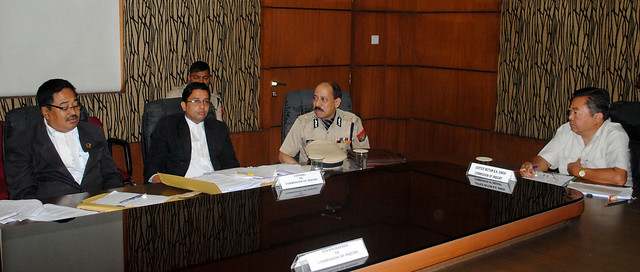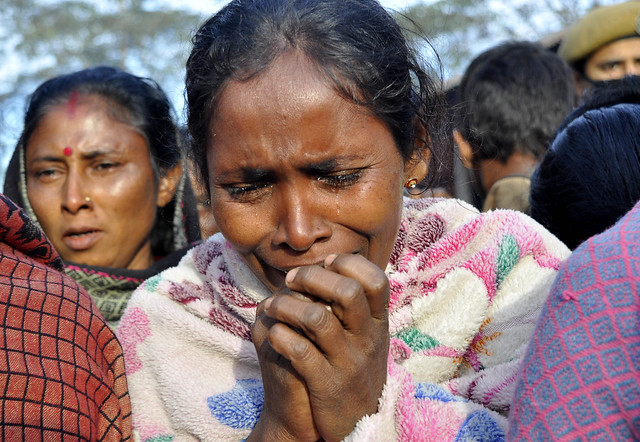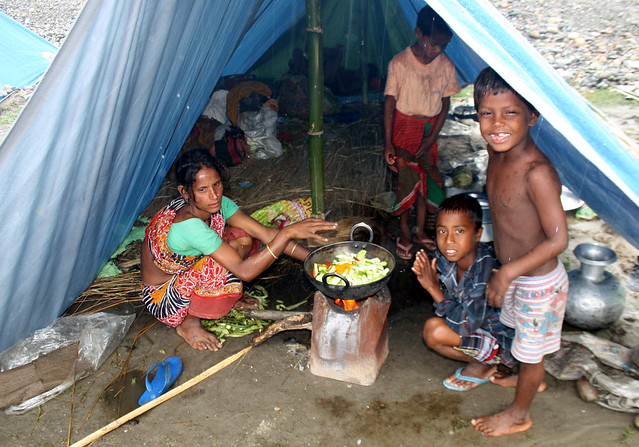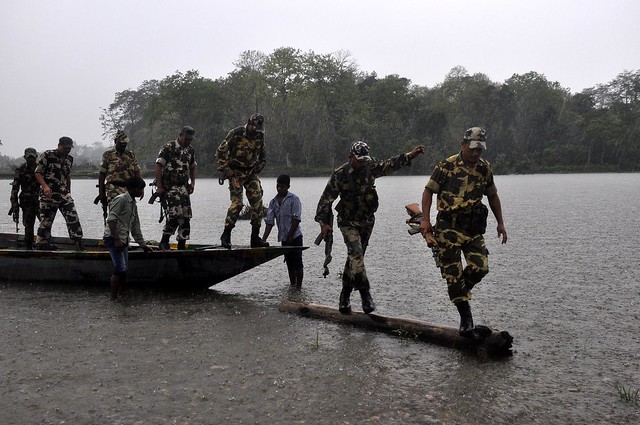One man Inquiry Commission records statement in Guwahati
By Abdul Gani, TwoCircles.net,
Guwahati: The ill-famed violence between the Bodo tribe and Muslims in Bodoland Territorial Area Districts (BTAD) in 2012 – which witnessed killing of more than hundred people and displaced at least four lakh villagers – could after all have been controlled faster but there was a huge lapse on the part of the administration, it was revealed on Friday.
Though Assam police had earlier claimed of taking a speedy action in responding to the violence, the state Home Department while deposing before the one man Commission probing the violence admitted that the additional forces were deployed in the conflict areas “a week after the violence begun.”

Assam DGP Khagen Sarma (second from right) appears before the one man inquiry commission in Guwahati.
The state government had in 2012 set up the commission headed by Mutum BK Singh, retired Judge of the Gauhati High Court, to find out the individuals or organizations responsible for the violence and to fix responsibility. The Commission will also determine the lapses, if any, on the part of civil and police administration in tackling the situation.
“LS Changsan, Assam Home Commissioner, today submitted an official letter dated July 24, 2012 which was sent to the Centre from state government seeking additional forces whereas the riots had begun on July 19. The additional forces reached BTAD around July 28. Till then, already hundreds were killed and millions were displaced,” advocate NH Mazarbhuyan, who was representing several minority organisations of BTAD, told media on Friday.
On the contrary, Assam police chief Khagen Sarma on Thursday had deposed before the Commission and reportedly said that state police had acted promptly during the violence in BTAD and forces were sent to the troubled areas immediately.

An inmates breaks down in relief camp after violence in BTAD
“This is a very contrasting development which has raised many questions,” Mazarbhuyan, who was present also when the DGP appeared in front of the commission, said and alleged that the police chief failed to clarify the state police’s role during the violence.
“There were allegations that security forces were not deployed on time. The DGP said the forces acted promptly. Earlier, all administrative and police officials admitted that forces were deployed at least three days after the violence, leading to escalation,” he said.
The Times of India in Guwahati reported that the DGP has even failed to tell exactly when state police would seize the illegal arms available in BTAD. The immense availability of illegal arms in the region is believed to help in maximize the killings.
After the violence broke out in BTAD, many human rights groups had slammed both the state and the Centre of criminal delay and dereliction of discharging their duties. The then Union Home Minister P Chidambaram while visiting the riot hit areas had said that there was not enough police force to contain conflagration.

A family affected in violence in BTAD in camps.
Many had suspected the role of the state government in the delay of deployment of central forces to control the violence.
“We had alleged that it was the negligence of the state government for which the deployment of the central forces got delayed by a week. If any government wants to control such violence, it can do it within 12 hours but we were bound to think that there was something fishy,” said Hafiz Ahmed, president of Char Chapori Sahitya Parishad (CCSP), a literary body of the state.
He also expressed regret at the delay of the process of inquiry. The one man inquiry commission which was constituted in 2012 itself was supposed to submit its report within six months but it’s now May 2015.
“It’s another way to escape. Delay means giving escape route to the culprits,” Ahmed added.

Security personnel during an operation in BTAD.
Even after that violence, a series of killings took place in the BTAD. In most of the instances, people belonging to the minority and Adivasi are the sufferers in such violence triggered by armed militants.
Armed militants belonging to the Songbijit faction of National Democratic Front of Bodoland (NDFB) killed 78 people belonging to Adivasi community in December 2014 in three districts of Assam. The violence had also left thousands of others displaced.
Earlier in May 2014, as many as 46 people, including 22 children, were gunned down in Baksa and Kokrajhar districts. Again in the month of July, four traders were abducted and killed in Baksa district.
In one of the horrific incidents, the militants of NDFB gunned down Priya Basumatary, a class IX student in broad day light in front of camera in Chirang district.
